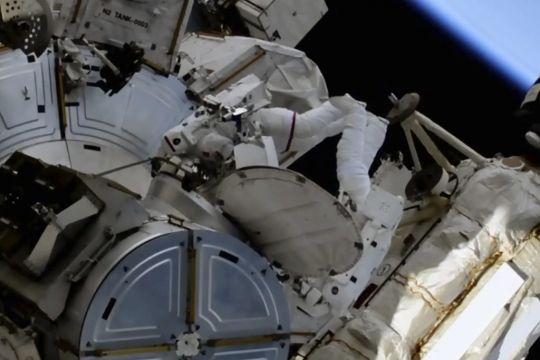Astronauts have ventured out on their second spacewalk in less than a week to install powerful new solar panels outside the International Space Station.
France’s Thomas Pesquet and Nasa’s Shane Kimbrough picked up where they left off on Wednesday, when spacesuit and other problems prevented them from unrolling the first in a series of high-tech solar panels.
“Remember: You are butterflies with biceps today,” astronaut Megan McArthur radioed from inside.
.@NASA TV is live now covering a spacewalk with @Astro_Kimbrough and @Thom_Astro to finish installing a new roll out solar array. https://t.co/aV5BUjAYXH
— International Space Station (@Space_Station) June 20, 2021
Advertisement
The spacewalkers managed to bolt down the first solar wing last week, but had to delay making the electrical connections and unfurling the panel to its full 63 feet in length.
These new solar wings are designed to roll out like a red carpet, unlike the station’s old ones that unfolded like an accordion.
They will give the ageing station a much-needed electrical boost, as demand for experiments and space tourists grows.
Nasa originally allotted two spacewalks for the job — one for each solar panel being installed.
But managers added a third spacewalk, given all the earlier problems.
LIVE SPACEWALK: @Astro_Kimbrough of @NASA_Astronauts and @Thom_Astro of @ESA work outside the @Space_Station to install new solar arrays. https://t.co/usLAy7mEXh
— NASA (@NASA) June 20, 2021
Pesquet and Kimbrough will go back out on Friday to complete work on the second panel delivered by Space X earlier this month.
This first pair will augment the space station’s oldest solar wings, which are degrading after 20 years of continuous operation.
SpaceX will deliver two more pairs over the next year.
Although smaller than the originals, the new solar panels can generate considerably more power.
The space station needs this re-energising if Nasa hopes to keep the space station running the rest of this decade, with private guests paying millions of dollars to come aboard.







